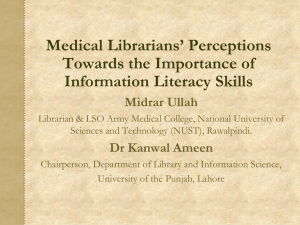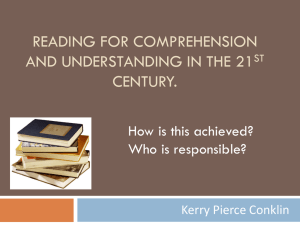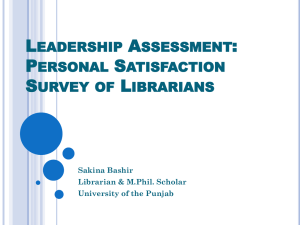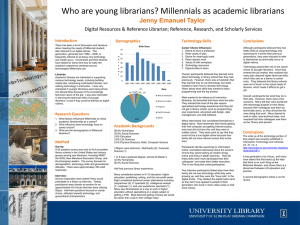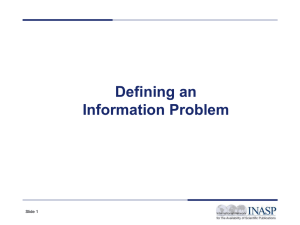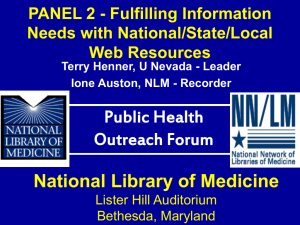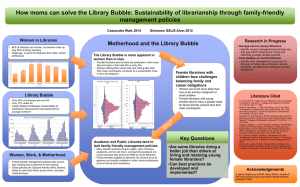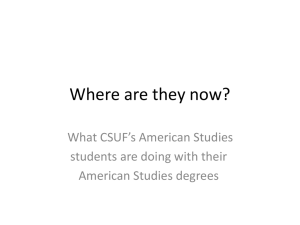PowerPoint - American Library Association
advertisement
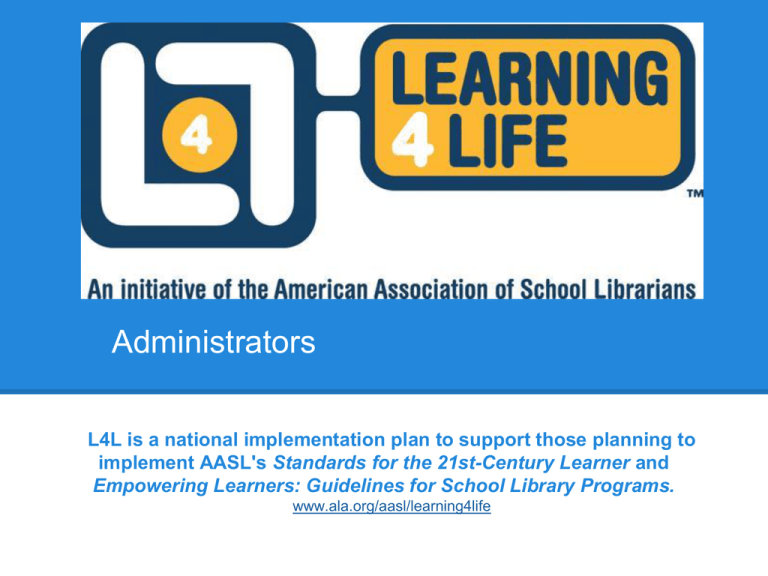
Administrators L4L is a national implementation plan to support those planning to implement AASL's Standards for the 21st-Century Learner and Empowering Learners: Guidelines for School Library Programs. www.ala.org/aasl/learning4life Objectives The purpose of this presentation is to: • Define the AASL overarching standards: Think, Create, Share, and Grow • • Make connections between the AASL Standards, Common Core Standards, and the role of school librarians Provide evidence that school librarians impact student learning How do School Librarians Empower Students to Think, Create, Share & Grow? With a heightened demand for critical thinking and collaborative problem solving, students must develop the skills to become lifelong learners. School librarians are in a key position to help guide students to make sense of new information in order to draw their own conclusions, create new knowledge, and share their knowledge with others in an increasingly global society. School librarians are educators who cross disciplines and grade levels as they work to empower every student with the skills, resources, and tools to: • • • • inquire, think critically, and gain knowledge; draw conclusions, make informed decisions, apply knowledge to new situations, and create new knowledge; share knowledge and participate ethically and productively as members of our democratic society; pursue personal and aesthetic growth. School Librarians are integral in implementing Common Core "shifts." • • more non-fiction informational texts • increased focus on reading and reading quantity • literacy is everyone’s concern • responding using the text and supporting answers using the text • use of technology as a vehicle for learning • short and sustained authentic research Inquire, THINK critically, and gain knowledge School Librarians teach students how to: • • • • • • • • • • • • Advance search using databases and a variety of internet search engines Boolean search using keywords and use these terms to further research Draw clear and appropriate conclusions supported by evidence and examples Evaluate sources using established criteria Filter information effectively Formulate the topic, problem or question independently Maintain a position and prove it Note take using a variety of print and digital strategies and tools Organize information effectively during all research stages Parenthetically cite sources according to standard style formats using signal phrases where appropriate Question sources for bias and omission Weigh the “pros and cons” of sources and media based on audience, purpose, and desired message Inquire, THINK critically, and gain knowledge They come to understand other perspectives and cultures. Students actively seek to understand other perspectives and cultures through reading and listening, and they are able to communicate effectively with people of varied backgrounds. They evaluate other points of view critically and constructively. Through reading great classic and contemporary works of literature representative of a variety of periods, cultures, and worldviews, students can vicariously inhabit worlds and have experiences much different than their own. They comprehend as well as critique. Students are engaged and open-minded—but discerning—readers and listeners. They work diligently to understand precisely what an author or speaker is saying, but they also question an author’s or speaker’s assumptions and premises and assess the veracity of claims and the soundness of reasoning. They build strong content knowledge. Students establish a base of knowledge across a wide range of subject matter by engaging with works of quality and substance. They become proficient in new areas through research and study. They read purposefully and listen attentively to gain both general knowledge and discipline-specific expertise. They refine and share their knowledge through writing and speaking. They value evidence. Students cite specific evidence when offering an oral or written interpretation of a text. They use relevant evidence when supporting their own points in writing and speaking, making their reasoning clear to the reader or listener, and they constructively evaluate others’ use of evidence. Inquire, THINK critically, and gain knowledge Common Core requires students to inquire, think critically, and gain knowledge. • • • CC.6.R.I.1 Key Ideas and Details: Cite textual evidence to support analysis of what the text says explicitly as well as inferences drawn from the text. CC.11-12.W.7 Conduct short as well as more sustained research projects to answer a question (including a self-generated question) or solve a problem; narrow or broaden the inquiry when appropriate; synthesize multiple sources on the subject, demonstrating understanding of the subject under investigation. CC.11-12.W.8 Gather relevant information from multiple authoritative print and digital sources, using advanced searches effectively; assess the strengths and limitations of each source in terms of the task, purpose, and audience; integrate information into the text selectively to maintain the flow of ideas, avoiding plagiarism and overreliance on any one source and following a standard format for citation. Draw conclusions, make informed decisions, apply knowledge to new situations, and CREATE new knowledge School Librarians teach students how to:: • • • • • • • Generate/incorporate visual elements including infographics, charts, diagrams, photographs, images into research products Collaborate with others to create visual presentations Know how to create, conduct, and incorporate interviews, surveys, and polls into research products Upload and embed documents/variety of files/widgets/ multimedia elements Respond to a blog and/or interactive document Synthesize and summarize information from multiple sources and perspectives Vary paraphrases, quotations, summary, and use of signal phrases to propel arguments Draw conclusions, make informed decisions, apply knowledge to new situations, and CREATE new knowledge They respond to the varying demands of audience, task, purpose, and discipline. • • • • Students adapt their communication in relation to audience, task, purpose, and discipline. They set and adjust purpose for reading, writing, speaking, listening, and language use as warranted by the task. They appreciate nuances, such as how the composition of an audience should affect tone when speaking and how the connotations of words affect meaning. They also know that different disciplines call for different types of evidence (e.g., documentary evidence in history, experimental evidence in science). Draw conclusions, make informed decisions, apply knowledge to new situations, and CREATE new knowledge Common Core requires students to use resources and tools to draw conclusions, make informed decisions, apply knowledge to new situations, and CREATE new knowledge. CC.11-12.R.I.7 Integrate and evaluate multiple sources of information presented in different media or formats (e.g., visually, quantitatively) as well as in words in order to address a question or solve a problem. CC.11-12.SL.2 Integrate multiple sources of information presented in diverse formats and media (e.g., visually, quantitatively, orally) in order to make informed decisions and solve problems, evaluating the credibility and accuracy of each source and noting any discrepancies among the data. Draw conclusions, make informed decisions, apply knowledge to new situations, and CREATE new knowledge • • • • • Activities that certified teacher librarians do: choose the technological tools that the students use to present new knowledge. model the dispositions necessary to question, research, and draw conclusions about new information. offer diverse resources (both digital and print) for research so that students can make informed, open minded conclusions about the answers to their questions. incorporate self-assessment strategies and questions for the students to review the research process. create lessons that incorporate student creating their own questions rather than finding simple facts. SHARE knowledge and participate ethically and productively as members of our democratic society School Librarians teach students how to: • • • • • • Collaboratively compose, curate, and share documents Determine how best to disseminate information Report findings in most effective format through appropriate publishing tools Research in real time using tools including social media Tag, comment, annotate, subscribe digitally Use word processing applications and advanced features including commenting and reviewing SHARE knowledge and participate ethically and productively as members of our democratic society They use technology and digital media strategically and capably. • • • Students employ technology thoughtfully to enhance their reading, writing, speaking, listening, and language use. They tailor their searches online to acquire useful information efficiently, and they integrate what they learn using technology with what they learn offline. They are familiar with the strengths and limitations of various technological tools and mediums and can select and use those best suited to their communication goals. SHARE knowledge and participate ethically and productively as members of our democratic society Common Core requires students to inquire, think critically, and gain knowledge. • • • CC.4.SL.4 Presentation of Knowledge and Ideas: Report on a topic or text, tell a story, or recount an experience in an organized manner, using appropriate facts and relevant, descriptive details to support main ideas or themes; speak clearly at an understandable pace. CC.5.SL.5 Presentation of Knowledge and Ideas: Include multimedia components (e.g., graphics, sound) and visual displays in presentations when appropriate to enhance the development of main ideas or themes. CC.11-12.W.6 Use technology, including the Internet, to produce, publish, and update individual or shared writing products in response to ongoing feedback, including new arguments or information. SHARE knowledge and participate ethically and productively as members of our democratic society Activities that certified teacher librarians do: • develop lessons that include collaboration among the students to create a product. • create websites or blogs that enable students and parents to access resources 24/7. • create self-assessment tools (rubrics, checklists) to evaluate their learning process. • connect curriculum to real life problems through lessons. • Librarians empower students to share their opinion of new books by creating book reviews Pursue personal and aesthetic GROWth According to a study conducted by the New Jersey Association of School Librarians, New Jersey's school libraries appear to contribute to learning outcomes in six key ways: "The development of affective, personal and interpersonal competencies, including the development of positive and ethical values in relation to the use of information, increased motivation and interest for engaging with information for learning and working effectively with others in research activities.” School Librarians teach students how to: • • • • • • • • Independently use an Online Public Access Catalog (OPAC) to locate materials to support personal reading and academic interests Locate and incorporate a variety of authoritative sources Practice the ethical/responsible use of information according to copyright and fair use guidelines Understand purpose for using primary vs. secondary sources Understand the purpose of citation (MLA and APA) Explore personal topics of interests Yield to the revision of search strategies and reevaluation of keywords Zero in on strengths and goals for improvement through ongoing reflection Pursue personal and aesthetic GROWth Common Core requires students to inquire, think critically, and gain knowledge. CC.5.SL.1.c Comprehension and Collaboration: Pose and respond to specific questions by making comments that contribute to the discussion and elaborate on the remarks of others. 1.1.3 Develop and refine a range of questions to frame search for new understanding. CC.5.SL.1.b Comprehension and Collaboration: Follow agreed-upon rules for discussions and carry out assigned roles. 3.2.2 Show social responsibility by participating actively with others in learning situations and by contributing questions and ideas during group discussions. Pursue personal and aesthetic GROWth Activities that certified teacher librarians do: • • • • teach students how to choose their own books for recreational reading (fiction) and/or building new knowledge (non-fiction). develop self-assessment tools for the students in the lessons to help students reflect on their work. assess (through surveys and informal feedback) their own library programs in order to improve it. collect data that show student's growth. Pursue personal and aesthetic GROWth They use technology and digital media strategically and capably. • • • Students employ technology thoughtfully to enhance their reading, writing, speaking, listening, and language use. They tailor their searches online to acquire useful information efficiently, and they integrate what they learn using technology with what they learn offline. They are familiar with the strengths and limitations of various technological tools and mediums and can select and use those best suited to their communication goals. School Librarians Impact Student Achievement “Students performed better on reading and writing tests where the principal placed high value on the librarian collaborating with teachers in planning and teaching and providing in-service education to teachers, met regularly with the librarian and appointed the librarian to serve on key school committees.” Source: Lance, Keith Curry. How Pennsylvania School Libraries Pay Off: Investments in Student Achievement and Academic Standards. http://paschoollibraryproject.org/research/ 2012. School Librarians Impact Student Achievement “Students who are poor, minority, and have IEPs, but who have full-time librarians, are at least twice as likely to have 'Advanced' writing scores as their counterparts without full-time librarians.” Source: Lance, Keith Curry. How Pennsylvania School Libraries Pay Off: Investments in Student Achievement and Academic Standards. http://paschoollibraryproject.org/research/ 2012. School Librarians Impact Student Achievement "Both [principals and library media specialists] touch the educational lives of every student through their interactions with students and teachers. However, the school library media specialist works with all the students, all the teachers, and all the curriculum all the time. While principals want to do this, they are often taken away to carry out other duties." Source: Woolls, Blanche. (2008). The School Library Media Manager, 4th Edition. Westport, CT: Libraries Unlimited (in publication). School Librarians Impact Student Achievement "With notable consistency, Advanced Reading and Writing scores tend to be earned by students at schools where administrators, teachers, and librarians believe the library program is “excellent” at teaching all four 21st Century Learner standards: Inquiry-Based Learning, Informed Decision-Making, Knowledge Sharing, and Pursuing Personal Growth.” Source: Lance, Keith Curry. How Pennsylvania School Libraries Pay Off: Investments in Student Achievement and Academic Standards. http://paschoollibraryproject.org/research/ 2012. Questions or Thoughts?

